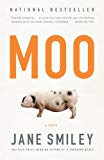
"Developmental Events", such as the history of divorces and separations among the characters are important to this book. Similarly, teachers and mentors of both sexes are seen trying to cultivate their own talents, making them appear larger than life. Smiley helps nurture Mrs. Walker’s genius in the book, creating a hero-like character that has a quiet feminine power that is often overlooked in some books. She is seen as someone “with quite complex power relationships…a person who gets things done” even though she is just a mere secretary. In contrast to this, all the administrators who are men are much older and do not have as big a role as Mrs. Walker in making decisions. Also, Mrs. Walker represents “tacit power…which construct[s] administrative workers as low level females.” The overt/position power is weak when it comes to Mrs. Walker’s knowledge ofthe university, which she withholds unless asked, making her the most powerful character in Moo .
Smiley also helps bring out themes of her life by writing about them in Moo . Two of the topics in the book are the issues with the history of divorce and break up. Smiley has been divorced three times, and many of her characters have complicated and interlaced relationships with one another(the relationship between Lady X and Chairman X, the ridiculous marriage of Dr. Dean Jellinek and Joy, and the failed relationship with Dean Nils Harsted and Marly Helmich). The mixture of relationships and satire in Moo creates absurd problems between the characters, but Smiley is still able to make it believable.
There is a“popular assumption that the academy is a ‘closed society’—idiosyncratic, isolated, out of touch with the ‘real world.” Moo U. is actually a part of the surrounding culture instead of a separate entity, and it “may be set off from the larger culture, but it is never cut off, a lifelineof money being necessary for its well-being and growth.” It is a symbol of the town itself. The search for a “comic protagonist to lead an unauthorized, irrelevant tour through academia” is and seems misguided. It is also considered a social comedy, where “no individual being is the heroiccenter of the institution.”
Already have an account? Log In Now